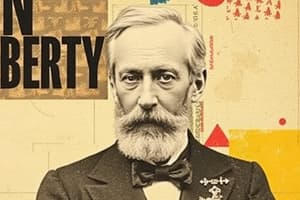Podcast
Questions and Answers
What is Mill's stance on limiting another's expression of opinion?
What is Mill's stance on limiting another's expression of opinion?
Limiting another's expression of opinion is wrong.
What is one of Mill's arguments against suppressing opinions?
What is one of Mill's arguments against suppressing opinions?
Suppressed opinions may be true.
According to Mill, humans are infallible.
According to Mill, humans are infallible.
False (B)
What do human beings need to correct their mistakes, according to Mill?
What do human beings need to correct their mistakes, according to Mill?
What does Mill imply about the relationship between dissenting opinions and understanding truth?
What does Mill imply about the relationship between dissenting opinions and understanding truth?
Which of the following statements reflects Mill's view on popular opinions?
Which of the following statements reflects Mill's view on popular opinions?
What does Mill say about the importance of debate in relation to 'dead dogma'?
What does Mill say about the importance of debate in relation to 'dead dogma'?
What argument does Mill present regarding the loss of meaning of opinions?
What argument does Mill present regarding the loss of meaning of opinions?
What does Mill suggest about partial truths?
What does Mill suggest about partial truths?
Mill asserts that all ethical ideas come solely from Christianity.
Mill asserts that all ethical ideas come solely from Christianity.
What does P1 state regarding any option P?
What does P1 state regarding any option P?
According to P2, if P is true, it should be suppressed.
According to P2, if P is true, it should be suppressed.
What is the main conclusion (C) derived from the arguments about option P?
What is the main conclusion (C) derived from the arguments about option P?
According to Mill, why is it hard to restrict free expression to 'fair discussion'?
According to Mill, why is it hard to restrict free expression to 'fair discussion'?
What example does Joel Feinberg use to illustrate limitations in free expression?
What example does Joel Feinberg use to illustrate limitations in free expression?
Mill believes it is law's place to restrict discussion based on offense.
Mill believes it is law's place to restrict discussion based on offense.
Flashcards are hidden until you start studying
Study Notes
Liberty of Thought and Discussion
- Limiting expression of opinion is deemed wrong, harmful to both the individual silenced and society as a whole.
- Mill emphasizes the importance of allowing diverse opinions, claiming that silencing individual viewpoints robs humanity of social growth and understanding.
Argument One: The Truth of Suppressed Opinions
- Suppressed opinions could potentially be true; humanity lacks infallibility in judging right beliefs.
- Mill argues that excluding dissenting views results in societal detriment, as individuals and communities lose opportunities for truth and growth.
- Historical examples are used to illustrate the consequences of persecuting minority opinions, such as the persecution of Socrates and the crucifixion of Christ.
Objections and Responses
- Critics argue people should act on their “conscientious convictions,” but Mill insists true confidence arises from openness to counter-evidence.
- Governments may uphold societal beliefs, but this assumption relies on infallibility, which Mill challenges; harmful mistakes arise from stifling dissent.
- The notion that truth survives persecution is questioned, as persecuted individuals contribute significantly to societal progress, and suppression can delay the recognition of truths.
Argument Two: Necessity of Debate
- If true opinions aren’t debated, they risk becoming “dead dogma”; ongoing discussion helps maintain understanding and keeps belief systems vibrant.
- Mill suggests that dissent, regardless of its accuracy, fosters essential debate that enhances comprehension of one's own beliefs.
- Knowledge and understanding emerge from challenges to opinions, making dissent indispensable.
Argument Three: Loss of Meaning
- Debating true opinions is necessary to preserve their meaning; unchallenged beliefs can lose relevance and understanding over time.
- Mill highlights the example of Christianity, expressing concern that a lack of challenge can lead to misunderstanding and superficial practice.
Argument Four: Partial Truths
- Conflicting doctrines often possess elements of truth; progress in thought reflects the integration of diverse, incompletely understood ideas.
- Dissent offers valuable insights that can spotlight neglected truths within popular beliefs, fostering a balanced discourse.
Objections to Argument Four
- Critics might insist that certain principles, like Christianity, are entirely true; Mill counters that even foundational beliefs require scrutiny to avoid incompleteness and one-sidedness.
- He argues for accepting a range of views to achieve a fuller understanding of ethical principles, emphasizing human imperfection.
Recap of Arguments
- Any opinion, whether true, false, or partially true, should not be suppressed; liberty of thought and discussion is foundational for truth discovery and moral progress.
- Mill structures his argument around various scenarios where beliefs may exist, underpinning the need for free expression and open debate.
Fair Discussion and Practicality
- Mill acknowledges the difficulty in enforcing standards of “fair discussion” in free expression.
- He warns that any attempts to restrict discussion based on such standards could lead to biases against dissenting voices.
- The balance between maintaining individual freedoms and addressing potentially offensive content remains a complex challenge in Mill's framework.
Studying That Suits You
Use AI to generate personalized quizzes and flashcards to suit your learning preferences.




